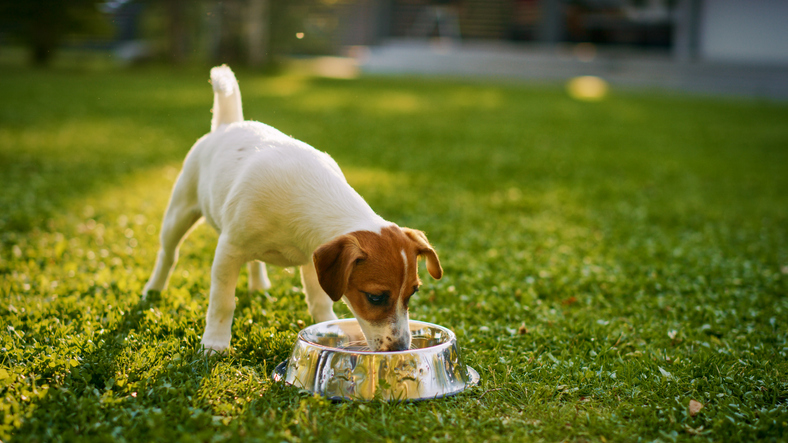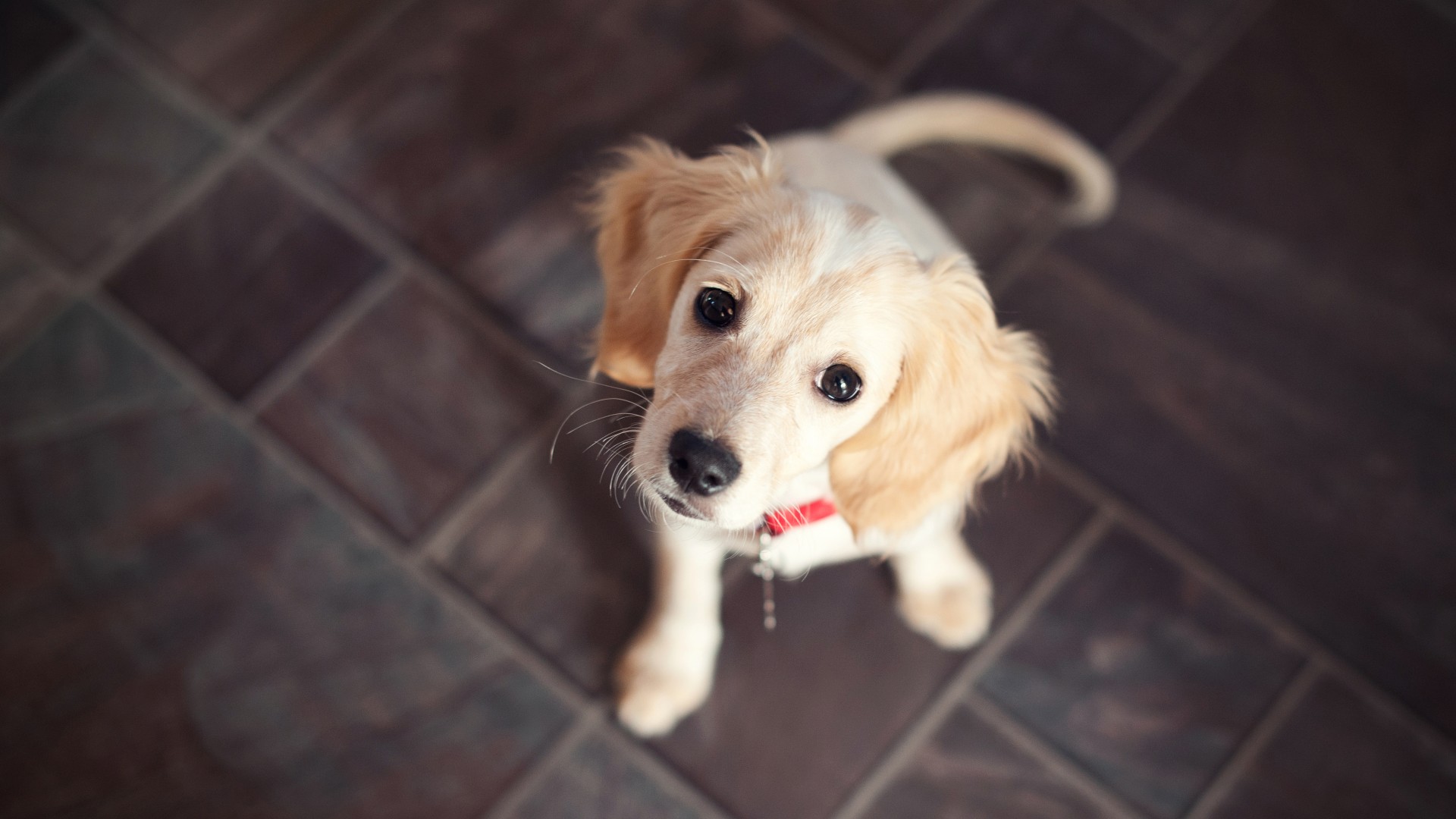Raw diets for puppies: A vet’s view
Learn why raw diets for puppies aren't recommended – and how to choose a safe diet instead!

When you take home a new puppy, you want to make sure you’re doing everything right, and that includes choosing the best puppy food. Raw diets for puppies are becoming increasingly popular amongst dog owners and breeders. Also known as Bones and Raw Food (BARF) or Raw Meat-Based Diets (RMBD), these feeding strategies rely on feeding primarily raw meat. To try to make the diet nutritionally balanced, they may also incorporate fresh fruits and vegetables, eggs, and vitamin supplements. Unfortunately, raw diets carry significant health risks to your pet, as well as humans, and there is no scientific evidence that this type of diet is beneficial.
Professional organizations, including the American Veterinary Medical Association (AVMA), the Canadian Veterinary Medical Association (CVMA), the American Animal Hospital Association (AAHA), and the World Small Animal Veterinary Association (WSAVA), have all released statements advising against the use of raw meat diets due to the risks posed to both pet and human health. Before deciding on a raw diet as the best puppy food for your new furbaby, make sure you understand the common pitfalls of this type of pet food.
- When should I stop feeding my dog puppy food? A vet answers
- How to choose puppy food: Our vet offers some advice
- When should I stop feeding my dog puppy food? A vet answers
Contamination risks of raw diets for puppies
One of the biggest concerns with raw diets is the risk posed by bacterial and parasitic contamination in raw meat. Dozens of studies have found that raw diets are frequently contaminated with bacteria like Salmonella, Listeria, and E. coli. These bacteria are commonly associated with food poisoning in people. Contamination with parasites, such as Toxoplasma and Sarcocystis, has also been demonstrated in raw meat diets in further research. These contaminated diets can cause severe illness, and puppies are much more susceptible because they have immature immune systems. If your heart is set on feeding raw, it's best to wait until your puppy's intestines and immune system are fully mature. And as with any diet change, it's worth introducing the new diet gradually and consulting your veterinarian first.
Your puppy is not the only one at risk from a contaminated raw diet. You wouldn't want to rub a raw chicken breast across your face, but when your dog eats raw meat and gives you a slobbery kiss, you are exposed to the same bacteria. Several studies have shown that dogs eating raw diets contaminated with Salmonella will shed the bacteria in their saliva and feces, so there’s a risk of transmission to humans. This is especially concerning in a puppy fed a raw diet because puppies tend to explore their new homes with their mouths! Young children, the elderly, and immunocompromised people are at the greatest risk of illness from these common contaminants. So, if you have vulnerable people in your household, you should avoid raw diets.
Many pet owners opt to use a freeze-dried diet, thinking it is a safer alternative to traditional raw diets. Unfortunately, the freeze-drying process doesn’t remove the risks altogether. Many bacteria can survive and even thrive after being freeze-dried. In fact, laboratories often use freeze-drying to preserve bacteria for research. So, it’s not surprising that this isn’t an effective method of dealing with bacterial contamination in your pet's food! Instead, opt for cooked diets, which destroy bacteria using high temperatures during the cooking process.
- When to start feeding puppies wet food: A vet's guide to weaning
- Puppy not eating? Try this…
Nutritional adequacy of raw diets for puppies

A balanced diet containing the right amounts of vitamins and minerals is essential to help your puppy grow and develop correctly. When puppies are growing, their nutritional demands are high, meaning they are very susceptible to dietary deficiencies and excesses. These nutritional imbalances can sadly lead to lifelong or even life-limiting health problems. Unfortunately, one study looking at both homemade and commercial raw diets found several nutritional inadequacies. This problem is even more prevalent in homemade raw food diets. One European study found that 60% of homemade raw diets had one or more serious nutritional imbalances that could lead to illness. Many raw food manufacturers don’t provide adequate labeling and nutritional adequacy data for their products. This makes it difficult for pet owners and veterinarians to know whether the diet is appropriate for a growing puppy.
Long-term, feeding an unbalanced diet can have disastrous consequences and could lead to serious health problems like panosteitis, Vitamin D deficiency (Rickets), and hyperparathyroidism. If you plan to feed your dog a homemade diet, whether it’s raw or cooked, you should wait until your dog is fully grown and always use a recipe from a qualified veterinary nutritionist.
Get the best advice, tips and top tech for your beloved Pets
Benefits of raw diets for puppies
Studies show no evidence of any proven benefit to feeding a raw diet to your puppy. Some owners report a reduced fecal output and a glossier coat; however, this is likely explained by these diets' lower fiber and higher fat content. Of course, you could experiment with different commercial cooked diets to find one with lower fiber and higher fat to see if it benefits your dog. Other raw food advocates maintain that it leads to better overall health and a stronger immune system, but there is no evidence to support this. Therefore, with so many safe and effective cooked diets available on the market and veterinary nutritionists strongly advising against raw diets for dogs, it makes much more sense to avoid the risks of a raw diet.
Choosing an appropriate diet for your puppy
We have a few helpful tips if you're wondering how to choose puppy food for your furbaby. Firstly, be sure to choose a commercial diet specifically labeled for puppies. If your puppy is a large or giant breed, there are breed and size-specific diets that ensure your puppy receives an adequate balance of minerals to support their growth. Your puppy should continue to eat commercially cooked puppy food until they are fully grown, which is around one year of age for most breeds.
To help you choose an appropriate product, you can learn how to read a pet food label and consult your veterinarian for product recommendations. You could also check to ensure the pet food manufacturer meets the World Small Animal Veterinary Association’s standards for reputable pet food companies.
Raw diets: A risky choice for puppies!
The bottom line is that raw diets are not recommended nor proven beneficial for any dog. However, puppies are particularly susceptible to the risks of raw diets due to their immature immune systems and rapid growth rate. The diet you choose for your puppy has a significant impact on their growth and development. So, set your puppy up for success later in life by choosing a puppy food that is safe, nutritionally complete, and balanced.
Dr. Elizabeth Racine is a small animal general practice vet covering all things pet health and wellness. Her special interests include veterinary behavior, nutrition, and internal medicine.
As a freelance writer, Dr. Racine has written content for major companies in the industry such as the American Kennel Club, Merck Animal Health, Bayer PetBasics, Elanco, and CareCredit. In her free time, Dr. Racine enjoys playing trampoline dodgeball, hiking with her beagle Dasher, and spending time with her three mischievous cats.

